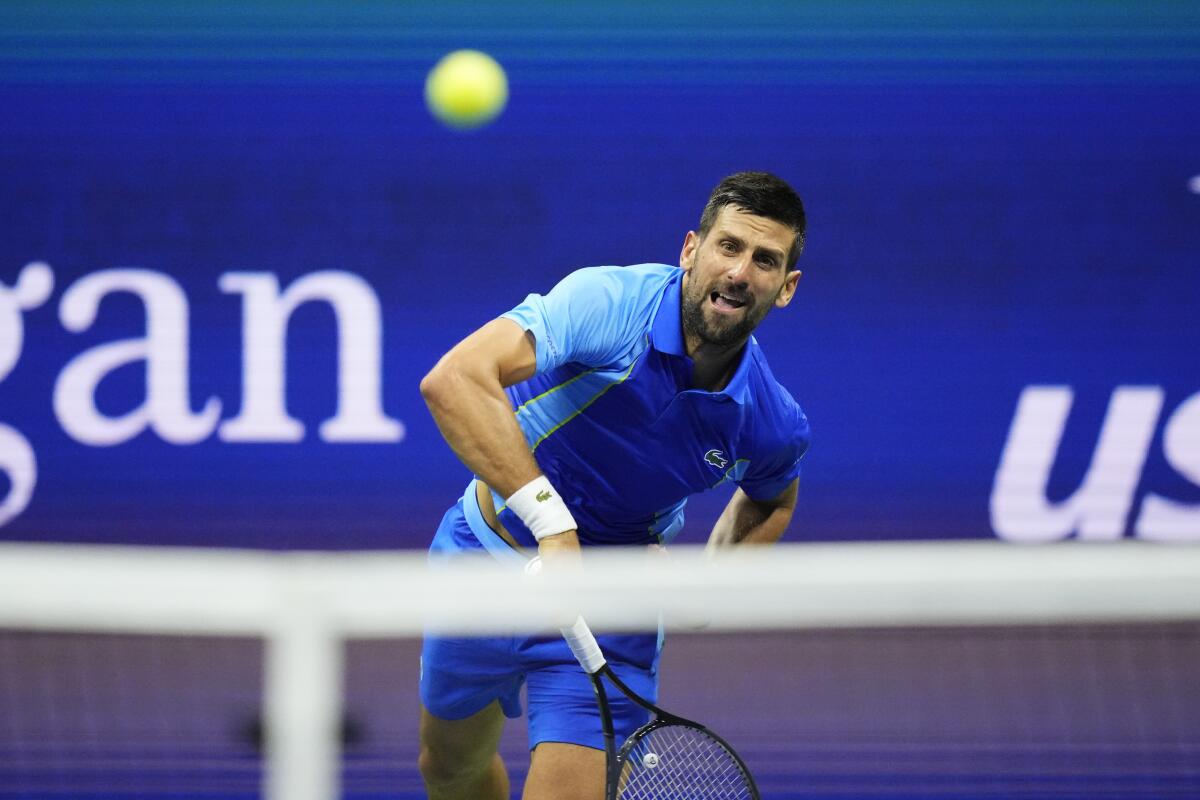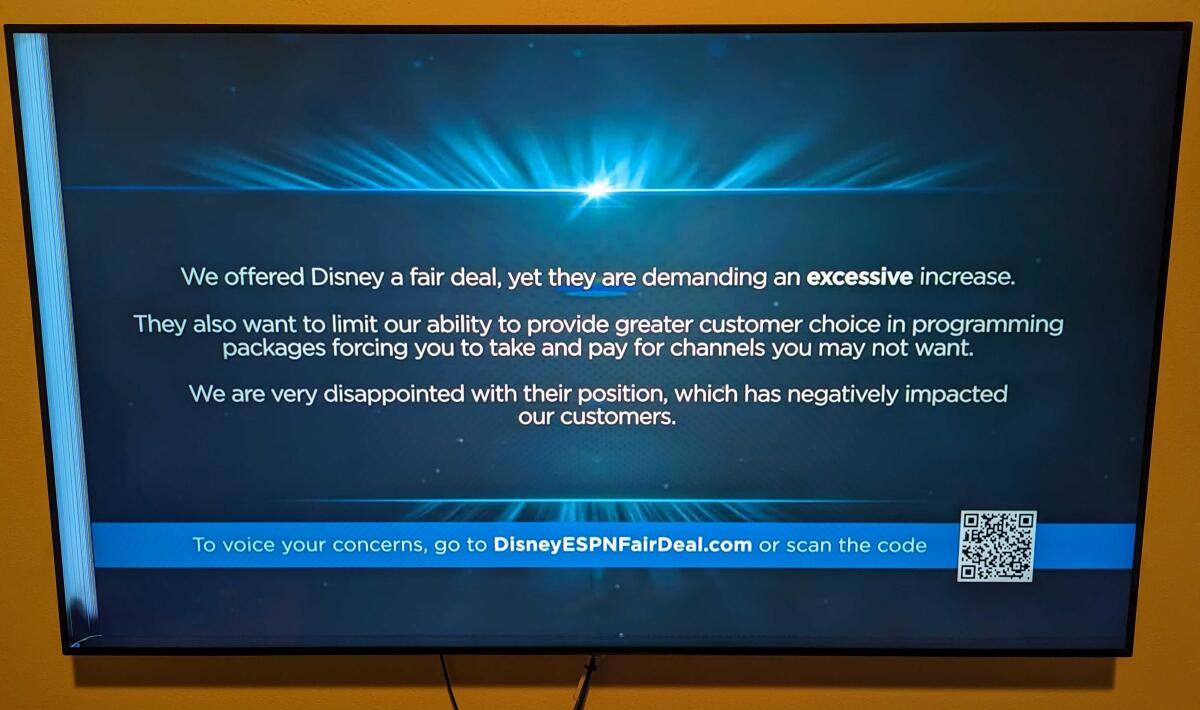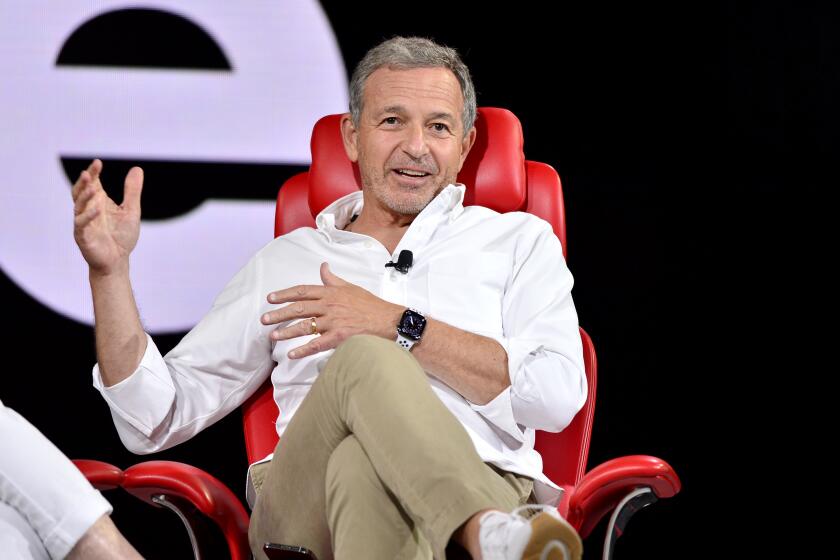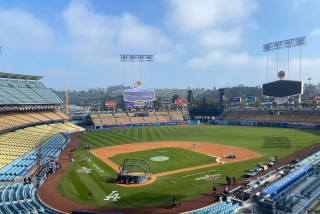Disney pulls ABC, ESPN and other channels from Charter Spectrum service. ‘This is not a typical blackout’

- Share via
Walt Disney Co. has pulled its channels, including ESPN and ABC stations, from Charter Communications’ Spectrum pay-TV service that reaches nearly 15 million subscriber homes nationwide in a festering fee dispute that could portend major changes for consumers.
Thursday night’s blackout on Spectrum came minutes before the kickoff of a highly anticipated college football game between the Utah Utes and Florida Gators on ESPN and during Spanish phenomenon Carlos Alcaraz’s tennis match at the U.S. Open in New York on ESPN2.
Sports fans around the country were furious. Local Spectrum subscribers who watch ABC broadcasts of “Jeopardy!” and “Wheel of Fortune” and KABC-TV Channel 7’s “Eyewitness News” also were out of luck. The channels went dark shortly before the start of the NFL regular season, consistently the most watched programming on TV. Other channels that are part of the outage include FX, Freeform, Disney Channel and National Geographic.
“We’ve been in ongoing negotiations with Charter Communications for some time and have not yet agreed to a new market-based agreement,” Disney said in a statement. “As a result, their Spectrum TV subscribers no longer have access to our unrivaled portfolio of live sporting events and news coverage plus kids, family and general entertainment programming.”
Charter Spectrum is the largest pay-TV provider in the Los Angeles region. The service has more than 5 million customers in California — a third of its nationwide total.
It was unclear Friday how quickly the two sides might iron out the dispute over carriage fees and terms — if they find a resolution at all. Charter Chief Executive Christopher Winfrey told analysts during a morning conference call that a deal must be hammered out soon, and the Burbank entertainment giant must give Charter greater leeway in how it offers Disney’s channels on Spectrum.
Otherwise, Winfrey said, Charter is prepared to live without Disney’s channels — including ESPN — even if it means losing subscribers, and thus hastening the rapid cord-cutting that has already upended the television business model.
“We’re either moving forward with a new collaborative video model, or we’re moving on,” Winfrey said. “We’re on the edge of a precipice... The video ecosystem is broken.”
The Charter dispute represents the latest significant challenge facing Disney and its chief executive, Bob Iger, who returned to the company last November and has since grappled with herculean headaches, including twin labor strikes that have all but shut down production of movies and scripted TV shows.
Earlier this summer, Iger said he would consider exiting the pay-TV business, including selling ABC and other networks, as viewers rapidly shift to direct-to-consumer streaming services. He said he is also open to taking on a minority strategic partner for ESPN that can help the sports giant’s transition to a direct-to-consumer model.
But as Iger tries to ease Disney into the streaming era, the older cable and satellite business continues to pay the bills.
The financial foundation of traditional entertainment companies, including Disney, is the revenue from monthly programming fees that Charter and other distributors pay to carry their channels. Charter said Friday it had planned to pay Disney $2.2 billion for its programming this year.
Disney has long used the power of its ESPN networks to secure premium rates from pay-TV providers. ESPN networks are considered “must-have” channels, so providers have grudgingly agreed to pay top dollar — an estimated $9 a month per subscriber home for the ESPN channels — to continue to carry them. Rates for most entertainment channels are less than $1 a month per home.
But not all cable customers watch sports.
Under the existing model, subscribers still have to pay for ESPN and other pricey sports channels, leading to rampant cord-cutting as millions of customers flee to less expensive streaming services.
Over the last five years, 25 million U.S. subscribers have ditched cable — representing nearly a quarter of all subscribers, Charter said.
“It’s staggering,” Winfrey said, noting the company was motivated to hold the line because it wants the flexibility to offer “slimmer,” cheaper packages without ESPN in an effort to appeal to customers who don’t watch sports. Charter also wants to offer comprehensive packages with sports.
On Friday, Disney pushed back against Charter’s claims, saying the Stamford, Conn.-based cable provider has “refused to enter into a new agreement with us that reflects market-based terms.”
“Contrary to their claims, we have offered Charter the most favorable terms on rates, distribution, packaging, advertising and more,” Disney said. “We have proposed creative ways to make Disney’s direct-to-consumer services available to their Spectrum TV subscribers, including opportunities for new and flexible packages where those services become a focal point of what the consumer might choose.”
Charter executives said they agreed to Disney’s financial terms but wanted to provide ad-supported versions of Disney+ and ESPN+ to its cable subscribers at no additional charge. In recent years, many of Disney’s biggest hits have gone to its streaming services — and Spectrum customers have helped subsidize those efforts, Winfrey said.
“It is clear at this point that this is not a typical blackout,” prominent cable analyst Craig Moffett wrote in a research report. “Charter seems genuinely willing to walk away from Disney, and even the entire linear video model, if necessary.”
Wall Street recognized the potential ramifications of the dispute. Disney’s stock was down 2.4% to $81.64 a share. Charter’s also fell 3.6% to $422.32.
Wall Street applauded Walt Disney Co.’s stunning move to replace CEO Bob Chapek five months after his contract was extended.
In recent years, channel outages have become more frequent as cable companies struggle to hold the line on expenses. Cable and satellite TV operators fear that big price hikes would only encourage additional subscribers to switch to streaming.
The Charter Spectrum outage isn’t the only ongoing cable fee dispute. Since early July, DirecTV customers have been without Nexstar TV stations, including KTLA-TV Channel 5 in Los Angeles. Shares of Texas-based Nexstar Media Group tumbled 13% to $141.50.
Programmers are seeking more revenue to pay the escalating TV rights fees demanded by sports leagues to broadcast their games. In the NFL’s most recent agreements with broadcasters, which kick in this month, the league will garner nearly double the revenue it collects from broadcasters, who are looking to pass along those costs.
Hefty fee increases by programmers are the reason subscribers are fleeing, said Rob Thun, DirecTV’s chief content officer.
“We have a symbiotic relationship where we both should benefit,” Thun said. “But they are killing the host.”
For Spectrum viewers, the next few weeks could be frustrating.
The NFL season begins next Thursday and Aaron Rodgers is scheduled to make his regular-season debut as a New York Jet on ESPN’s “Monday Night Football” Sept. 11. Charter has millions of subscribers in New York. Meanwhile, ESPN and ABC are scheduled to air at least 10 college football games featuring Top 25 teams Thursday through Monday, during the first full weekend of the season. The U.S. Open championships wrap up Sept. 10.
Instead of the normal programming, Spectrum subscribers nationwide were greeted by a blue screen with text. “We apologize for the inconvenience and are continuing to negotiate in good faith in order to reach a fair agreement,” the cabler’s message said, directing subscribers to a website titled DisneyESPNFairDeal.com.

Millions of DirecTV customers lost access to Nexstar channels after the two companies failed to agree to a new distribution contract by a Sunday night deadline.
Disney signaled Friday that it’s not ready to give up one of its most lucrative partners.
“We value our relationship with Charter and we are ready to get back to the negotiation table to restore access to our unrivaled content to their customers as quickly as possible,” the company said in a statement, adding that it was “committed to reaching a mutually agreed upon resolution with Charter.”
Times staff writers Stephen Battaglio and Iliana Limón Romero contributed to this report.
More to Read
Inside the business of entertainment
The Wide Shot brings you news, analysis and insights on everything from streaming wars to production — and what it all means for the future.
You may occasionally receive promotional content from the Los Angeles Times.













